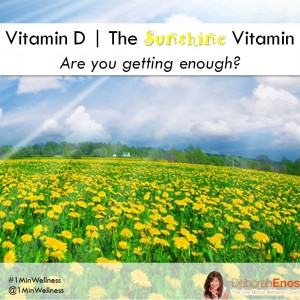
14 May Why You Need More Vitamin D – The ‘Sunshine’ Vitamin

According to a study in the Archives of Internal Medicine, those with the lowest vitamin D levels more than doubled the risk of death from heart disease and other ailments when compared to those with the highest. The following ailments have been linked to low vitamin D levels:
- Fibromyalgia. In one recent study a group was given Vitamin D supplements and another group was given a placebo. The group given Vitamin D improved significantly while the placebo group remained unchanged.
- Breast cancer. Women who maintain a slightly higher level of vitamin D in their body (42ng/mL) are significantly less likely to have breast cancer and another study found that in those with breast cancer, tumor growth is prevented and kept from expanding its blood supply.
- Colon cancer. Researchers estimate that 50% of colon cancer could be prevented by maintaining a blood level of 34ng/mL.
- Heart Disease. According to one study, men who were deficient in vitamin D were twice as likely to have a heart attack as men who had adequate levels of vitamin D.
The research is clear, anyone who lives north of the 35th parallel (I know, I had to look it up too. It’s any area north of San Diego) is in danger of being vitamin D deficient. And it’s nearly impossible to get enough from food (unless your diet consists of cod liver oil, mushrooms and oysters…). Before you run out and buy a supplement*, follow these steps.
- First, head to the doctor and get tested before you start taking vitamin D. This is not a vitamin that you want to “guess-t-mate” when it comes to the quantity to supplement.
- Plan to get a daily dose of sunshine whenever possible.
- Eat more vitamin D rich foods such as salmon, egg yolks, mushrooms, shrimp, tuna and fish oil.
Now get outside, take a walk and soak up some sun (with proper protection of course). Your health depends on it!
*NOTE: The elderly and those with darker skin, will need more sun exposure or supplementation to get the proper levels because their bodies naturally produce less vitamin D. If you have a wheat or dairy intolerance, your body will have a hard time absorbing vitamin D from your supplement. You must get a supplement that is wheat or dairy free.






Pingback:Why You Need More Vitamin D – The ‘Sunshine’ Vitamin
Posted at 15:29h, 25 May[…] Source: Deborahenos […]
Pingback:Why You Need More Sunshine & How to Get it
Posted at 14:30h, 26 July[…] foods and other sources. When we put on too much protective sunscreen, we block it out. Many health conditions have a direct link to low levels of vitamin D; just a few of them […]